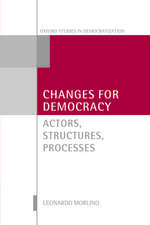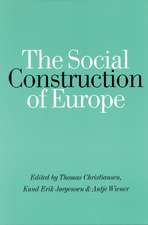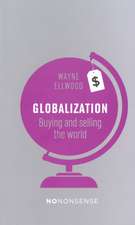Political Science: A Global Perspective
Autor Leonardo A. Morlino, Dirk Berg-Schlosser, Bertrand Badieen Limba Engleză Paperback – 5 apr 2017
Political Science: A Global Perspective is a new, advanced-level introduction to political science from the internationally renowned, award-winning team behind the International Encyclopaedia of Political Science.
With breath-taking scope, and moving beyond the mainstream 'traditional' approach, Political Science: A Global Perspective is a progressive account of the increasing interrelationships and interactions of different levels of politics, from the individual and local, to the national and international, in today's "glocalized" world.
Key features:
- Systematically guides the reader through all key areas of political science: origins, methodological foundations, key topics, and current issues in a series of short, incisive chapters
- Takes an international and pluralist perspective with all issues explored in a comparative way related to different cultural and historical contexts
- Learning features including boxed descriptions of major concepts, further reading and self-assessment questions at the end of each chapter.
Political Science: A Global Perspective is the prefect introduction for postgraduates who are new to political science, as well as upper-level undergraduates looking to broaden and deepen their understanding of core topics.
| Toate formatele și edițiile | Preț | Express |
|---|---|---|
| Paperback (1) | 352.22 lei 3-5 săpt. | +30.15 lei 5-11 zile |
| SAGE Publications – 5 apr 2017 | 352.22 lei 3-5 săpt. | +30.15 lei 5-11 zile |
| Hardback (1) | 982.38 lei 6-8 săpt. | |
| SAGE Publications – 5 apr 2017 | 982.38 lei 6-8 săpt. |
Preț: 352.22 lei
Nou
67.40€ • 70.55$ • 56.10£
Carte disponibilă
Livrare economică 10-24 martie
Livrare express 22-28 februarie pentru 40.14 lei
Specificații
ISBN-10: 1412962145
Pagini: 312
Dimensiuni: 170 x 242 x 23 mm
Greutate: 0.57 kg
Ediția:First Edition
Editura: SAGE Publications
Colecția Sage Publications Ltd
Locul publicării:London, United Kingdom
Recenzii
What makes this book an exceedingly good introduction to Political Science is that the discipline’s core concepts, theories, methods and the subfields into which it has branched out are presented in an unprecedented fashion: concise and yet broad-based and open-ended. These are qualities derived from its comprehensive global reach – an achievement that has many aspects to it. First, by recovering the diversity of the social contexts and of the intellectual backgrounds from which the “basics” emerged, their embedded nature comes out neatly. With it, the discipline’s actual constitution as an empirical science is brought under a sharper focus: as the result of a long gestation and differentiation from neighbouring sciences– where the primacy of the Anglo-Saxon and Western intellectual lineages is set in a broader perspective. We note pluralism not only in the approach to rival interpretations of the relevant topics and issues but also in the choice of the supporting literature including also scholars from different parts of the emerging world – alongside references drawn from non-Western traditions.
What the reader gets is more than what Morlino, Berg-Schlosser and Badie declare in their preface. More than “elementary politics from an advanced standpoint”, their book has a truly formative dimension to it. On two accounts: In terms of training, it offers the incentives to permanently update and broaden the research fields, thanks to a system of open-ended information provided by the websites added to each chapter. In terms of scope, the book ‘s manifest global reach offers a most effective antidote against all kinds of prescriptivism.
Cuprins
Introduction: Origins of political science and definitions
Part I: Background
1. Epistemological foundations and approaches
2. Research designs and methods
3. Relations with neighbouring disciplines
Part II: Macro-politics
4. The social bases of politics
5. Democracies
6. Democratizations
7. Non-democratic regimes
Part III: Governance
8. Government, Parliaments, Judiciary
9. Public administration and public policies
Part IV: Meso- and Micro-politics
10. Political participation, social movements, protests, revolutions
11. Political Communication, Media
12. Interest Groups
13. Political Parties
14. Elections and electoral behavior
Part V: International Politics
15. The globalization of inter-national politics
16. Regionalism and beyond
Glossary
Bibliography
Index
Notă biografică
Leonardo Morlino is Professor of Political Science and Director of the International Research Center on Democracies and Democratizations at LUISS, Rome. He was President of the International Political Science Association (IPSA) (2009-12).
He is the author of more than 30 books and more than 200 journal essays and book chapters published in English, French, German, Spanish, Hungarian, Chinese, Mongolian, and Japanese. His most recent books include: Changes for Democracy (Oxford UP, 2011), Democracias y Democratizaciones (CIS, 2008); Democratization and the European Union: Comparing Central and Eastern European Post-Communist Countries (Routledge 2010, with W. Sadurski), International Actors, Democratization and the Rule of Law: Anchoring Democracy? (Routledge 2008, with A. Magen). He was also one of the three editors of the International Encyclopedia of Political Science (8 voll., Sage Publications, 2011), that won the Honorable Mention of Darthmouth Medal for reference publishing in all domains of knowledge.
Morlino was Professor of Political Science at the University of Florence and at the Istituto di Scienze Umane in Florence and has held a number of visiting professorships. In 2002-03 he was the Bechtel Visiting Professor at Stanford¿s Graduate School of Business; in 1995 visiting fellow at the Hoover Institution; and in 1989-90 NATO Fellow of the Center for European Studies, Stanford University. His academic credentials also include stints as the Monte dei Paschi Fellow at St. Anthony¿s College, Oxford (2010), the Jemolo Fellow at Nuffield College, Oxford (2007 and 1998); visiting professor at the Juan March Institute, Madrid (1995-96); and visiting professor at the Institut d¿Etudes Politiques, Paris (1993-95, 2006, 2009, 2013).
Morlino is a leading specialist in comparative politics with expertise on Southern and Eastern Europe, with a focus on phenomenon of democratization. Now he is directing a new research on the impact of the 2008-14 economic crisis of the six European large democracies.













